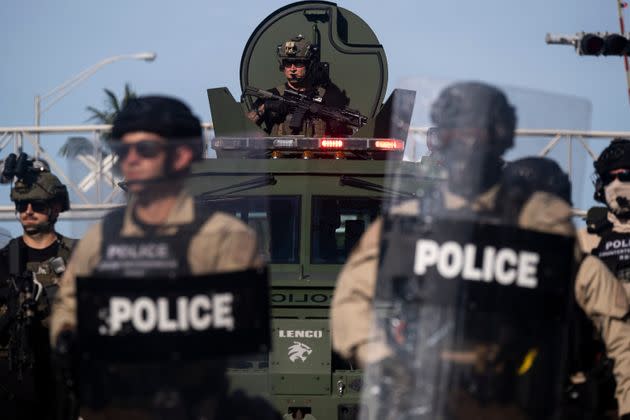Progressives In Congress Ask Biden's Cabinet To Rein In Military Surplus Transfers To Cops
- Oops!Something went wrong.Please try again later.

A police officer in military gear watches protesters from an armored vehicle during a May 31, 2020, rally in Miami in response to the police murder of George Floyd in Minneapolis a week earlier. (Photo: RICARDO ARDUENGO/AFP via Getty Images)
A group of progressive senators and Congress members have written to President Joe Biden’s Cabinet to urge the adoption of broad new restrictions on the federal programs that sell and transfer surplus military gear to sheriff’s offices and police departments, HuffPost has learned.
“Militarized law enforcement increases the prevalence of police violence without making our communities safer,” they wrote, in a letter obtained by HuffPost. “When law enforcement has access to military equipment, they are more likely to use it, rather than other more appropriate and traditional law enforcement tools. Furthermore, the negative effects of police militarization disproportionately affects communities of color.”
Led by Reps. Ayanna Pressley (D-Mass.), Hank Johnson (D-Ga.) and Sen. Brian Schatz (D-Hawaii), the members urged action as the administration faces a self-imposed deadline to decide whether new restrictions on militarized policing are necessary.
In May, on the second anniversary of the police murder of George Floyd in Minneapolis, Biden signed two executive orders designed to rein in police abuse and roll back police militarization.
One of the orders tasked members of his Cabinet with scrutinizing the multiple programs that sell, transfer or provide grants for military vehicles, weapons and equipment designed for foreign wars to local law enforcement departments, and to determine the need for new restrictions within 60 days. Silencers, firearms and ammunition of .50 caliber or greater, stun and flash-bang grenades, and tracked and armored vehicles (except those useful for public safety emergencies) are all under consideration to be banned.
“This equipment should be prohibited from being transferred to or purchased by law enforcement agencies either with federal funds or from federal agencies or contractors,” the members of Congress wrote, adding that the administration should also explore recalling any equipment it prohibits.
Those overseeing programs that fund or transfer military equipment are Defense Secretary Lloyd J. Austin III, Attorney General Merrick Garland, Treasury Secretary Janet Yellen, Homeland Security Secretary Alejandro Mayorkas and General Services Administrator Robin Carnahan.
When law enforcement has access to military equipment, they are more likely to use it.
Federal programs have helped arm thousands of U.S. police departments with military-style vehicles, weapons and tactical equipment, and fueled aggressive tactics against the public. After Floyd’s murder, police in dozens of cities responded to nonviolent protesters in armored vehicles and body armor. Many departments have used flash-bang grenades and armored vehicles for routine police work, such as serving warrants and making traffic stops.
Dozens of agencies have claimed they need military equipment in order to protect officers in high-risk situations or to protect the public during natural disasters only to then use the equipment to terrorize Black neighborhoods, peaceful protests against police and Native American environmental activists, a series of HuffPost investigations found last year.
The investigations showed restrictions on the program to be incredibly lax. For example, although agencies that have violated civilians’ civil rights are nominally banned from the program, the ban is so narrowly defined that the Defense Department made a literal rubber stamp to approve transfers.
After the 2014 protests in Ferguson, Missouri, over the police killing of 18-year-old Michael Brown, police used military-style gear in their brutal crackdown on nonviolent protestors. President Barack Obama responded by imposing restrictions on the transfer of some controversial items, such as tracked vehicles, but President Donald Trump lifted the restrictions during his first year in office, and congressional efforts to reimpose limits have stalled.
This article originally appeared on HuffPost and has been updated.
